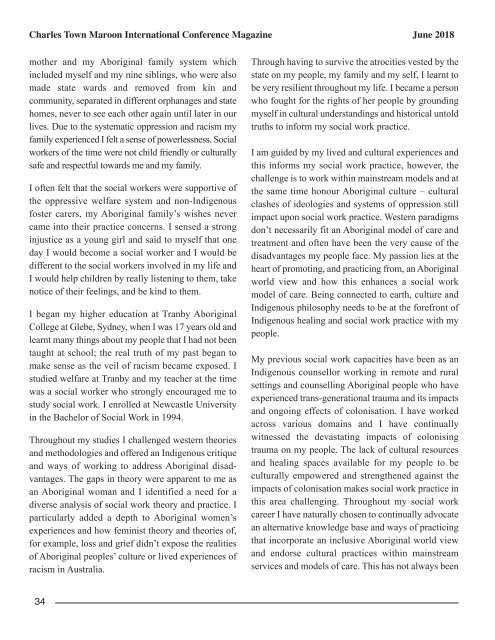Maroon Magazine 2018_266
Create successful ePaper yourself
Turn your PDF publications into a flip-book with our unique Google optimized e-Paper software.
Charles Town <strong>Maroon</strong> International Conference <strong>Magazine</strong> June <strong>2018</strong><br />
mother and my Aboriginal family system which<br />
included myself and my nine siblings, who were also<br />
made state wards and removed from kin and<br />
community, separated in different orphanages and state<br />
homes, never to see each other again until later in our<br />
lives. Due to the systematic oppression and racism my<br />
family experienced I felt a sense of powerlessness. Social<br />
workers of the time were not child friendly or culturally<br />
safe and respectful towards me and my family.<br />
I often felt that the social workers were supportive of<br />
the oppressive welfare system and non-Indigenous<br />
foster carers, my Aboriginal family’s wishes never<br />
came into their practice concerns. I sensed a strong<br />
injustice as a young girl and said to myself that one<br />
day I would become a social worker and I would be<br />
different to the social workers involved in my life and<br />
I would help children by really listening to them, take<br />
notice of their feelings, and be kind to them.<br />
I began my higher education at Tranby Aboriginal<br />
College at Glebe, Sydney, when I was 17 years old and<br />
learnt many things about my people that I had not been<br />
taught at school; the real truth of my past began to<br />
make sense as the veil of racism became exposed. I<br />
studied welfare at Tranby and my teacher at the time<br />
was a social worker who strongly encouraged me to<br />
study social work. I enrolled at Newcastle University<br />
in the Bachelor of Social Work in 1994.<br />
Throughout my studies I challenged western theories<br />
and methodologies and offered an Indigenous critique<br />
and ways of working to address Aboriginal disadvantages.<br />
The gaps in theory were apparent to me as<br />
an Aboriginal woman and I identified a need for a<br />
diverse analysis of social work theory and practice. I<br />
particularly added a depth to Aboriginal women’s<br />
experiences and how feminist theory and theories of,<br />
for example, loss and grief didn’t expose the realities<br />
of Aboriginal peoples’ culture or lived experiences of<br />
racism in Australia.<br />
Through having to survive the atrocities vested by the<br />
state on my people, my family and my self, I learnt to<br />
be very resilient throughout my life. I became a person<br />
who fought for the rights of her people by grounding<br />
myself in cultural understandings and historical untold<br />
truths to inform my social work practice.<br />
I am guided by my lived and cultural experiences and<br />
this informs my social work practice, however, the<br />
challenge is to work within mainstream models and at<br />
the same time honour Aboriginal culture – cultural<br />
clashes of ideologies and systems of oppression still<br />
impact upon social work practice. Western paradigms<br />
don’t necessarily fit an Aboriginal model of care and<br />
treatment and often have been the very cause of the<br />
disadvantages my people face. My passion lies at the<br />
heart of promoting, and practicing from, an Aboriginal<br />
world view and how this enhances a social work<br />
model of care. Being connected to earth, culture and<br />
Indigenous philosophy needs to be at the forefront of<br />
Indigenous healing and social work practice with my<br />
people.<br />
My previous social work capacities have been as an<br />
Indigenous counsellor working in remote and rural<br />
settings and counselling Aboriginal people who have<br />
experienced trans-generational trauma and its impacts<br />
and ongoing effects of colonisation. I have worked<br />
across various domains and I have continually<br />
witnessed the devastating impacts of colonising<br />
trauma on my people. The lack of cultural resources<br />
and healing spaces available for my people to be<br />
culturally empowered and strengthened against the<br />
impacts of colonisation makes social work practice in<br />
this area challenging. Throughout my social work<br />
career I have naturally chosen to continually advocate<br />
an alternative knowledge base and ways of practicing<br />
that incorporate an inclusive Aboriginal world view<br />
and endorse cultural practices within mainstream<br />
services and models of care. This has not always been<br />
34


